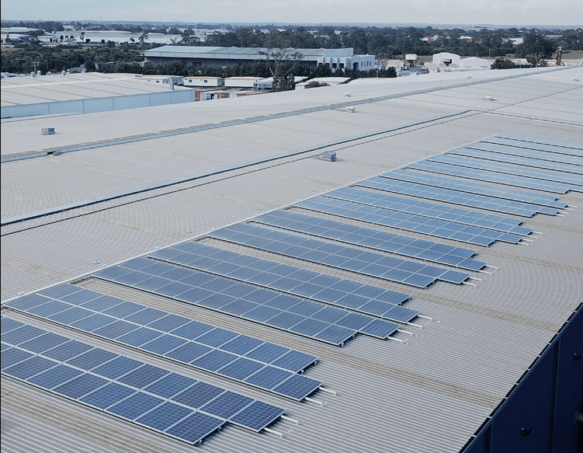BLOG
BENEFITS OF SOLAR POWER FOR BUSINESS

As we move toward 2020, the benefits of solar power over fossil fuels are becoming increasingly clear. Alongside the strong environmental imperative for commercial solar installation to catch on, it also represents an opportunity for businesses looking to update their approach to energy use while future-proofing their bottom line.
Here are three benefits of solar power for business.
- 1. Solar dramatically reduces electricity costs
- 2. ‘Green’ credentials improve your public image
- 3. Government incentives mean faster returns on investment
1. SOLAR DRAMATICALLY REDUCES ELECTRICITY COSTS
Electricity prices in Australia have more than doubled in the last 10 years, making them among the world’s highest. Not only that, but the increases have come at an unprecedented rate that’s disproportionate to CPI and wages.
In most cases, by installing a solar system on your commercial building, you’ll immediately see a reduction on your electricity bill as you have reduced your business’ reliance on the grid. Over time, your system can pay for itself through these savings.
In addition, you’ll be making an investment in future-proofing your business against the continued rise and volatility of grid electricity prices. Recent research from the Australian Energy Regulator projects that energy consumers will increasingly rely on self-generated and stored energy over the coming years. This suggests that the process of stepping away from reliance on the grid will be supported by a growing solar industry that is not affected by the unpredictable changes in fossil fuel markets.
As a bonus, you can be confident your investment will stand the test of time. Solar panels are designed to withstand exposure to the elements, despite the fragile nature of their individual photovoltaic cells. These are encased and protected by specialised, highly tempered glass, and framed with non-corrosive aluminium – an extremely sturdy structure. Tier 1 solar panels come with a 12 year manufacturer’s warranty and even a 25 year performance warranty.
2. ‘GREEN’ CREDENTIALS IMPROVE YOUR PUBLIC IMAGE
A less tangible but nonetheless valuable return on investing in solar energy are the PR benefits that this can bring to your business. Solar power systems provide a measurable contribution to the global reduction of CO2 in the atmosphere, which businesses can promote in their corporate marketing material and communications. In turn, this can increase the public image of your business as socially responsible, environmentally aware, progressive and future-focused.
Research from Sustainability Victoria indicates that 78% of Victorians believe climate change is ‘an issue that requires urgent action’, and 73% prefer to buy from businesses that show t| hey care about climate change. Internationally, a recent study shows that a third of consumers are now making buying decisions based on the environmental and social credentials of brands, while another global study suggests that this rate is much higher for millennials, an increasingly important consumer group.
A further consideration, particularly for businesses situated in high-visibility buildings, is that visible solar panels may improve public image by directly displaying this message within a streetscape.
Many businesses are finding ways to apply their green credentials to their competitive advantage when responding to tenders and bidding for contracts. This can be supported through various industry-specific sustainability accreditation and certification programs – see, for example, the Victorian state government’s suggestions for green credential validation in the tourism industry.
3. GOVERNMENT INCENTIVES MEAN FASTER RETURNS ON INVESTMENT
Commercial solar system costs are made more manageable by various financial incentives available via the federal and state governments.
SMALL-SCALE TECHNOLOGY CERTIFICATES (STCS)
Small-Scale Technology Certificates (STCs) are a tradable commodity established by the federal government. These certificates are created at their current trading price when a specified and approved energy-saving activity (such as installing a commercial solar system) has been completed. Once registered, the certificates can be offered to the customer in the form of a rebate on the system being purchased. Note that the Renewable Energy Target (RET), the program under which the current certificate schemes operate, is now close to being met. The Federal Government will be closing the scheme in 2020 and this form of certificate will no longer be available.
NEW SOUTH WALES & VICTORIAN SOLAR ENERGY REBATES
There also exist similar, state-specific certificate trading schemes, such as the Victorian Energy Efficiency Certificate (VEEC) and the NSW’s Energy Saving Certificate (ESC), for other energy efficiency initiatives such as LED lighting upgrades. These can work in tandem with a commercial solar system to support a movement away from reliance on the grid.
FEED-IN TARIFFS
In Australia, feed-in tariffs are schemes run by state and territory governments. These schemes mean that businesses are eligible to be paid for surplus energy generated by their solar systems, which is exported to the main grid. As an example, find information on Victoria’s feed-in tariff system here.
ENVIRONMENTAL UPGRADE AGREEMENTS
Environmental Upgrade Agreements (EUAs) are a Victorian and NSW council-based financing mechanism enabling improved access long term finance for environmental upgrades, including solar system installation, to existing commercial and non-residential buildings on attractive terms.
COUNCIL BASED INCENTIVES
Other council-specific incentives may be available in your area – see, for example, the Moreland Energy$mart Program, in collaboration with the Moreland Energy Foundation.
REIMAGINE ENERGY WITH CHERRY ENERGY SOLUTIONS
If all this has you convinced that solar energy is the way forward for your business, you’re not alone. Cherry Energy Solutions has worked to create future-ready businesses across Australia and can help you reimagine your commercial building’s energy system.
Contact us today or call us on 1300 570 886.
LATEST ARTICLES
